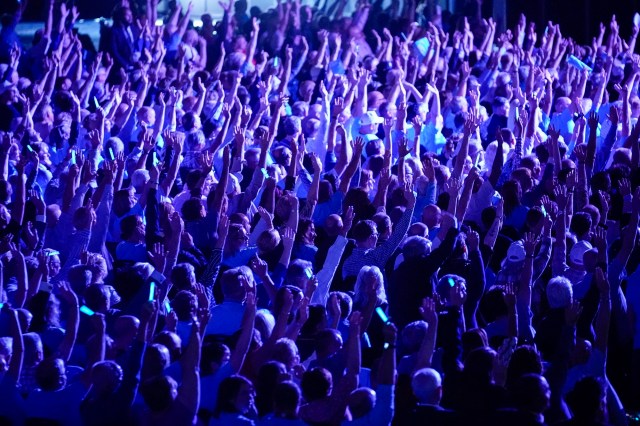Brexit Party supporters attend the party’s Big Vision Rally in Birmingham, England. Credit: Christopher Furlong/Getty Images

The most significant thing to happen in British politics over the weekend wasn’t Stormzy leading the crowd in a ‘Fuck Boris’ chant at Glastonbury, nor was it Jeremy Hunt’s genteel 16 minutes on the Andrew Marr show.
It was easily missed. None of the Sunday papers trailed it, apart from the Express. And today it has been consigned to the inner pages of the dailies.
Yet while most of the country was out enjoying the sunshine, over 5,000 Brexit Party supporters made their way to the NEC in Birmingham to watch Nigel Farage present his economic agenda for beyond Brexit and vision for the long-term future of his movement. Boris Johnson is in his sights.
It says much about the bizarre state of today’s politics, that this newly minted party’s ability to summon such a crowd on a sunny Sunday barely merits mention. It’s another reminder that while Westminster is looking the other way, Mr Farage is building a national movement to rival any of the major parties.
A few on Twitter have noticed, and drawn rather hysterical comparisons with the Second World War. As I watched it being livestreamed, the atmosphere seemed to be more frenetic than sinister, attempting, not entirely successfully, to replicate an American political rally. The mainly middle-aged English crowd were given glowsticks (in Brexit turquoise, of course) and told to wave them in total darkness to the unlikely sounds of techno music and American hip-hop. “Its like a disco!” laughed Farage as he walked on stage.
Then came his survival plan for a Boris Johnson era.
The central plank of Boris’s candidacy is that he and only he can see off the threat from the Brexit Party. It’s why Tory MPs came into line for him in their droves; it’s why he looks set to become prime minister. Farage clearly has other ideas.
Before yesterday’s event I was already sceptical of the logic. Even if the Conservatives were able to win back every single defector to the Brexit Party and reassemble their 2017 coalition, it would still leave them without a functional majority (and they will have haemorrhaged many more Remain-voting Conservatives along the way).
Last week’s voting intention poll from YouGov – taken during blanket Boris Johnson media coverage and a near-universal expectation that he will become pm – shows the Tories and Brexit party level-pegging at 22% each, a shift of 3% in the Conservatives’ favour. If the front-runner were such catnip to Brexit party voters, you would expect to see a more substantial drift than that.
The presumption is that Farage would be keen to do a deal with Johnson and go into coalition with him. On the evidence of yesterday, he’s not planning to make it easy for him: “Mr Johnson, you can try if you want to, but I will not be put back in my box by you or anybody else.”
First, he made clear that any version of Theresa May’s deal that Boris manages to pass, however amended, will be declared a betrayal and will serve to supercharge the Brexit Party: “It’s not a deal, its Monsieur Barnier’s new European Treaty… it must never pass in this country.”
The only scenario in which Mr Farage offered (in an arch reference to Donald Trump’s meeting with the North Korean leader), a “meeting in the demilitarised zone”, would be if Boris successfully delivered a no-deal Brexit. That means not just making no-deal Brexit his policy, but actually managing to deliver it and remaining in office.
This is such a remote scenario, and one that would be accompanied by such political and economic turbulence, that the Brexit Party leader is clearly not losing sleep over it.
Secondly, his policy agenda explicitly casts the Brexit Party as the party of the regions, pitted against an over-dominant capital. “As London grows richer, as London grows bigger, as London grows more powerful, so much of the rest of this country feels left behind,” Farage said.
The central platform is a £200bn regional investment fund, funded by scrapping HS2 (on the grounds that it only brings wealthy people to London faster), halving the foreign aid budget (no more sending money overseas) and withholding the £39bn payment to the EU.
In this hypothetical Brexit Party world, the money would go instead on removing business rates entirely outside London to revive small retailers and regional highstreets, improving transport from east to west across the North (ie avoiding London) and investing in high-speed internet and mobile phone connectivity in deprived regions across the country.
Never mind that the sums are highly dubious; the politics are significant. Farage’s offer is a hybrid of anti-corporate populism and Thatcherite appeal to small business owners. He is responding to a deeply held feeling across the country that London has benefited over recent decades as the regions have declined. And crucially it makes Boris Johnson, inextricably associated with London as its twice-elected Mayor, a highly vulnerable adversary.
Farage has worked out Boris Johnson’s greatest potential weakness among this audience: he’s a quintessential metropolitan liberal. It is often forgotten as he talks up proroguing parliament to deliver no deal and does his best to associate himself with Winston Churchill.
But you would struggle to find a more cosmopolitan, international, fancy-talking, London-loving politician in all England. If Farage can successfully make it a wider contest based on region and class, he could put Boris on the ropes from the outset and rob him of the raison-d’être of his leadership.










Join the discussion
Join like minded readers that support our journalism by becoming a paid subscriber
To join the discussion in the comments, become a paid subscriber.
Join like minded readers that support our journalism, read unlimited articles and enjoy other subscriber-only benefits.
Subscribe